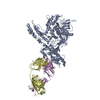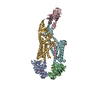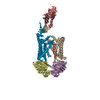+ Open data
Open data
- Basic information
Basic information
| Entry | Database: PDB / ID: 7oh1 | ||||||
|---|---|---|---|---|---|---|---|
| Title | Tetanus neurotoxin LC-HN domain in complex with TT110-Fab1 | ||||||
 Components Components |
| ||||||
 Keywords Keywords | TOXIN / tetanus / tetanus neurotoxin / humAbs / monoclonal antibody / tetanus prophylaxis / spastic paralysis / tetanus immunoglobulin / TIG | ||||||
| Function / homology |  Function and homology information Function and homology informationprotein transmembrane transporter activity / metalloendopeptidase activity / toxin activity / proteolysis / extracellular region / zinc ion binding Similarity search - Function | ||||||
| Biological species |  Clostridium tetani (bacteria) Clostridium tetani (bacteria) Homo sapiens (human) Homo sapiens (human) | ||||||
| Method | ELECTRON MICROSCOPY / single particle reconstruction / cryo EM / Resolution: 8 Å | ||||||
 Authors Authors | Grinzato, A. / Kandiah, E. / Zanotti, G. | ||||||
 Citation Citation |  Journal: J Clin Invest / Year: 2021 Journal: J Clin Invest / Year: 2021Title: Exceptionally potent human monoclonal antibodies are effective for prophylaxis and treatment of tetanus in mice. Authors: Marco Pirazzini / Alessandro Grinzato / Davide Corti / Sonia Barbieri / Oneda Leka / Francesca Vallese / Marika Tonellato / Chiara Silacci-Fregni / Luca Piccoli / Eaazhisai Kandiah / ...Authors: Marco Pirazzini / Alessandro Grinzato / Davide Corti / Sonia Barbieri / Oneda Leka / Francesca Vallese / Marika Tonellato / Chiara Silacci-Fregni / Luca Piccoli / Eaazhisai Kandiah / Giampietro Schiavo / Giuseppe Zanotti / Antonio Lanzavecchia / Cesare Montecucco /     Abstract: We used human monoclonal antibodies (humAbs) to study the mechanism of neuron intoxication by tetanus neurotoxin and to evaluate these antibodies as a safe preventive and therapeutic substitute for ...We used human monoclonal antibodies (humAbs) to study the mechanism of neuron intoxication by tetanus neurotoxin and to evaluate these antibodies as a safe preventive and therapeutic substitute for hyperimmune sera to treat tetanus in mice. By screening memory B cells from immune donors, we selected 2 tetanus neurotoxin-specific mAbs with exceptionally high neutralizing activities and extensively characterized them both structurally and functionally. We found that these antibodies interfered with the binding and translocation of the neurotoxin into neurons by interacting with 2 epitopes, whose identification pinpoints crucial events in the cellular pathogenesis of tetanus. Our observations explain the neutralization ability of these antibodies, which we found to be exceptionally potent in preventing experimental tetanus when injected into mice long before the toxin. Moreover, their Fab derivatives neutralized tetanus neurotoxin in post-exposure experiments, suggesting their potential for therapeutic use via intrathecal injection. As such, we believe these humAbs, as well as their Fab derivatives, meet the requirements to be considered for prophylactic and therapeutic use in human tetanus and are ready for clinical trials. | ||||||
| History |
|
- Structure visualization
Structure visualization
| Movie |
 Movie viewer Movie viewer |
|---|---|
| Structure viewer | Molecule:  Molmil Molmil Jmol/JSmol Jmol/JSmol |
- Downloads & links
Downloads & links
- Download
Download
| PDBx/mmCIF format |  7oh1.cif.gz 7oh1.cif.gz | 250.6 KB | Display |  PDBx/mmCIF format PDBx/mmCIF format |
|---|---|---|---|---|
| PDB format |  pdb7oh1.ent.gz pdb7oh1.ent.gz | 199.3 KB | Display |  PDB format PDB format |
| PDBx/mmJSON format |  7oh1.json.gz 7oh1.json.gz | Tree view |  PDBx/mmJSON format PDBx/mmJSON format | |
| Others |  Other downloads Other downloads |
-Validation report
| Arichive directory |  https://data.pdbj.org/pub/pdb/validation_reports/oh/7oh1 https://data.pdbj.org/pub/pdb/validation_reports/oh/7oh1 ftp://data.pdbj.org/pub/pdb/validation_reports/oh/7oh1 ftp://data.pdbj.org/pub/pdb/validation_reports/oh/7oh1 | HTTPS FTP |
|---|
-Related structure data
| Related structure data |  12891MC  7oh0C C: citing same article ( M: map data used to model this data |
|---|---|
| Similar structure data |
- Links
Links
- Assembly
Assembly
| Deposited unit | 
|
|---|---|
| 1 |
|
- Components
Components
| #1: Protein | Mass: 99924.320 Da / Num. of mol.: 1 / Source method: isolated from a natural source / Source: (natural)  Clostridium tetani (bacteria) / References: UniProt: Q93N27 Clostridium tetani (bacteria) / References: UniProt: Q93N27 |
|---|---|
| #2: Antibody | Mass: 24298.252 Da / Num. of mol.: 1 / Source method: isolated from a natural source / Source: (natural)  Homo sapiens (human) Homo sapiens (human) |
| #3: Antibody | Mass: 23023.553 Da / Num. of mol.: 1 / Source method: isolated from a natural source / Source: (natural)  Homo sapiens (human) Homo sapiens (human) |
| Has protein modification | Y |
-Experimental details
-Experiment
| Experiment | Method: ELECTRON MICROSCOPY |
|---|---|
| EM experiment | Aggregation state: PARTICLE / 3D reconstruction method: single particle reconstruction |
- Sample preparation
Sample preparation
| Component |
| ||||||||||||||||||||||||
|---|---|---|---|---|---|---|---|---|---|---|---|---|---|---|---|---|---|---|---|---|---|---|---|---|---|
| Source (natural) |
| ||||||||||||||||||||||||
| Buffer solution | pH: 7.6 | ||||||||||||||||||||||||
| Specimen | Embedding applied: NO / Shadowing applied: NO / Staining applied: NO / Vitrification applied: YES | ||||||||||||||||||||||||
| Vitrification | Cryogen name: ETHANE |
- Electron microscopy imaging
Electron microscopy imaging
| Experimental equipment |  Model: Titan Krios / Image courtesy: FEI Company |
|---|---|
| Microscopy | Model: FEI TITAN KRIOS |
| Electron gun | Electron source:  FIELD EMISSION GUN / Accelerating voltage: 300 kV / Illumination mode: FLOOD BEAM FIELD EMISSION GUN / Accelerating voltage: 300 kV / Illumination mode: FLOOD BEAM |
| Electron lens | Mode: BRIGHT FIELD |
| Image recording | Electron dose: 40 e/Å2 / Film or detector model: GATAN K2 SUMMIT (4k x 4k) |
- Processing
Processing
| CTF correction | Type: NONE |
|---|---|
| 3D reconstruction | Resolution: 8 Å / Resolution method: FSC 0.143 CUT-OFF / Num. of particles: 98170 / Symmetry type: POINT |
 Movie
Movie Controller
Controller












 PDBj
PDBj

